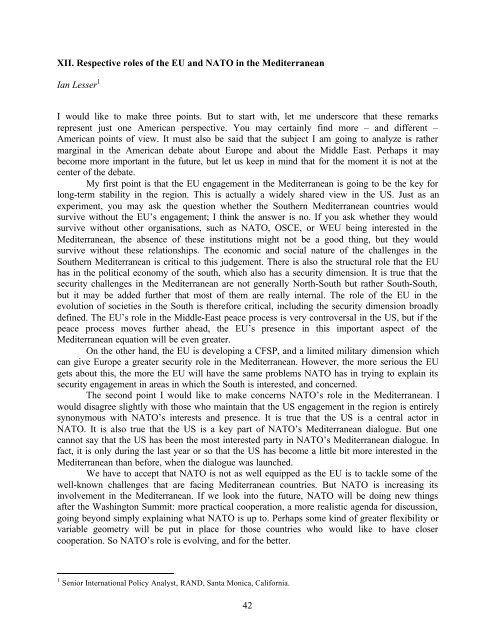The future of the Euro-Mediterannean security dialogue
The future of the Euro-Mediterannean security dialogue
The future of the Euro-Mediterannean security dialogue
Create successful ePaper yourself
Turn your PDF publications into a flip-book with our unique Google optimized e-Paper software.
XII. Respective roles <strong>of</strong> <strong>the</strong> EU and NATO in <strong>the</strong> Mediterranean<br />
Ian Lesser 1<br />
I would like to make three points. But to start with, let me underscore that <strong>the</strong>se remarks<br />
represent just one American perspective. You may certainly find more – and different –<br />
American points <strong>of</strong> view. It must also be said that <strong>the</strong> subject I am going to analyze is ra<strong>the</strong>r<br />
marginal in <strong>the</strong> American debate about <strong>Euro</strong>pe and about <strong>the</strong> Middle East. Perhaps it may<br />
become more important in <strong>the</strong> <strong>future</strong>, but let us keep in mind that for <strong>the</strong> moment it is not at <strong>the</strong><br />
center <strong>of</strong> <strong>the</strong> debate.<br />
My first point is that <strong>the</strong> EU engagement in <strong>the</strong> Mediterranean is going to be <strong>the</strong> key for<br />
long-term stability in <strong>the</strong> region. This is actually a widely shared view in <strong>the</strong> US. Just as an<br />
experiment, you may ask <strong>the</strong> question whe<strong>the</strong>r <strong>the</strong> Sou<strong>the</strong>rn Mediterranean countries would<br />
survive without <strong>the</strong> EU’s engagement; I think <strong>the</strong> answer is no. If you ask whe<strong>the</strong>r <strong>the</strong>y would<br />
survive without o<strong>the</strong>r organisations, such as NATO, OSCE, or WEU being interested in <strong>the</strong><br />
Mediterranean, <strong>the</strong> absence <strong>of</strong> <strong>the</strong>se institutions might not be a good thing, but <strong>the</strong>y would<br />
survive without <strong>the</strong>se relationships. <strong>The</strong> economic and social nature <strong>of</strong> <strong>the</strong> challenges in <strong>the</strong><br />
Sou<strong>the</strong>rn Mediterranean is critical to this judgement. <strong>The</strong>re is also <strong>the</strong> structural role that <strong>the</strong> EU<br />
has in <strong>the</strong> political economy <strong>of</strong> <strong>the</strong> south, which also has a <strong>security</strong> dimension. It is true that <strong>the</strong><br />
<strong>security</strong> challenges in <strong>the</strong> Mediterranean are not generally North-South but ra<strong>the</strong>r South-South,<br />
but it may be added fur<strong>the</strong>r that most <strong>of</strong> <strong>the</strong>m are really internal. <strong>The</strong> role <strong>of</strong> <strong>the</strong> EU in <strong>the</strong><br />
evolution <strong>of</strong> societies in <strong>the</strong> South is <strong>the</strong>refore critical, including <strong>the</strong> <strong>security</strong> dimension broadly<br />
defined. <strong>The</strong> EU’s role in <strong>the</strong> Middle-East peace process is very controversal in <strong>the</strong> US, but if <strong>the</strong><br />
peace process moves fur<strong>the</strong>r ahead, <strong>the</strong> EU’s presence in this important aspect <strong>of</strong> <strong>the</strong><br />
Mediterranean equation will be even greater.<br />
On <strong>the</strong> o<strong>the</strong>r hand, <strong>the</strong> EU is developing a CFSP, and a limited military dimension which<br />
can give <strong>Euro</strong>pe a greater <strong>security</strong> role in <strong>the</strong> Mediterranean. However, <strong>the</strong> more serious <strong>the</strong> EU<br />
gets about this, <strong>the</strong> more <strong>the</strong> EU will have <strong>the</strong> same problems NATO has in trying to explain its<br />
<strong>security</strong> engagement in areas in which <strong>the</strong> South is interested, and concerned.<br />
<strong>The</strong> second point I would like to make concerns NATO’s role in <strong>the</strong> Mediterranean. I<br />
would disagree slightly with those who maintain that <strong>the</strong> US engagement in <strong>the</strong> region is entirely<br />
synonymous with NATO’s interests and presence. It is true that <strong>the</strong> US is a central actor in<br />
NATO. It is also true that <strong>the</strong> US is a key part <strong>of</strong> NATO’s Mediterranean <strong>dialogue</strong>. But one<br />
cannot say that <strong>the</strong> US has been <strong>the</strong> most interested party in NATO’s Mediterranean <strong>dialogue</strong>. In<br />
fact, it is only during <strong>the</strong> last year or so that <strong>the</strong> US has become a little bit more interested in <strong>the</strong><br />
Mediterranean than before, when <strong>the</strong> <strong>dialogue</strong> was launched.<br />
We have to accept that NATO is not as well equipped as <strong>the</strong> EU is to tackle some <strong>of</strong> <strong>the</strong><br />
well-known challenges that are facing Mediterranean countries. But NATO is increasing its<br />
involvement in <strong>the</strong> Mediterranean. If we look into <strong>the</strong> <strong>future</strong>, NATO will be doing new things<br />
after <strong>the</strong> Washington Summit: more practical cooperation, a more realistic agenda for discussion,<br />
going beyond simply explaining what NATO is up to. Perhaps some kind <strong>of</strong> greater flexibility or<br />
variable geometry will be put in place for those countries who would like to have closer<br />
cooperation. So NATO’s role is evolving, and for <strong>the</strong> better.<br />
1 Senior International Policy Analyst, RAND, Santa Monica, California.<br />
42
















